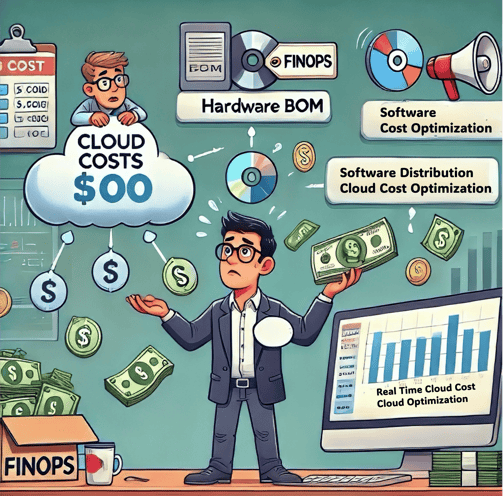Years ago, during the early days of the Cloud movement, I came across a humorous meme (were they even called memes back then? Nostalgia has a way of making me feel more "vintage" with each passing year) that stated:
Text originally published at d-exchange.com website on January 10th 2025. Written by uncleeduardo
"The Cloud isn't really a thing; it's just someone else's computer."
This observation, while amusing, highlights an essential truth: relying on resources we don't own comes at a cost.
In the ever-evolving landscape of product management, where balancing customer needs, technical feasibility, and business objectives is the norm, mastering FinOps adds a critical dimension to success.
FinOps, short for Financial Operations, is a collaborative practice that helps teams from various disciplines manage cloud costs effectively while creating business value. For Product Managers (PMs), integrating FinOps into their workflows has become not just a recommendation but a necessity. Here's why....
Navigating Cloud Challenges
With the proliferation of cloud services, organizations enjoy new levels of flexibility and growth. However, this comes with a drawback: the risk of spiraling costs. According to the FinOps Foundation and Gartner, 80% of organizations overshoot their cloud budgets due to poor cost governance and a lack of cloud optimization strategies.
Being the Product Manager responsible for the life cycle of a Product, this situation creates a dual challenge:
-
Balancing Costs and Innovation: The cloud offers PMs the flexibility to test and deploy features rapidly. However, unchecked expenses can erode profitability and put products at risk.
-
Cross-Functional Alignment: Effective product management requires seamless collaboration with engineering, finance, and other teams. FinOps provides the framework to ensure everyone is on the same page regarding cloud spending.
FinOps Principles Tailored for Product Management
FinOps isn't just a finance or engineering responsibility—it's a collaborative effort rooted in principles that align perfectly with the core tenets of Agile Product Management:
-
Teams Need to Collaborate: FinOps fosters collaboration between engineering, finance, and PM teams, ensuring decisions are data-driven and value-oriented.
-
Decisions are Driven by Business Value: PMs can use FinOps data to prioritize features and allocate resources to initiatives that deliver the highest ROI.
-
Take Advantage of the Variable Cost Model: PMs can align feature rollouts with budget forecasts by understanding cloud cost variability, enabling flexibility without compromising financial targets.
How FinOps Empowers Product Managers
Informed Decision-Making: FinOps provides PMs with helpful information they can act on about cloud usage and costs, enabling them to:
-
Understand Cost Drivers: Analyze how specific features or services contribute to overall expenses.
-
Evaluate Trade-Offs: Make informed decisions on performance vs. cost, ensuring alignment with business goals.
For instance, imagine a PM at a SaaS company evaluating whether to implement a resource-intensive feature, such as one that requires a lot of server power. FinOps data can reveal whether the projected customer acquisition or retention increase justifies the associated cloud costs.
Enhanced Collaboration Across Teams: Product Managers thrive (or at least should) in cross-functional environments. FinOps strengthens this collaboration by:
-
Aligning engineering efforts with cost-saving initiatives.
-
Providing finance teams with the context to support strategic investments.
-
Offering clear visibility into cost allocations, fostering accountability.
Faster Iterations and Innovation: FinOps enables real-time monitoring of cloud spend, which is crucial for Agile teams aiming for rapid iterations and to have validated learning as quick as possible. PMs can:
-
Run Experiments Without Fear: Knowing cloud usage is monitored and optimized encourages innovation.
-
Adjust Quickly: If a test consumes excessive resources, PMs can pivot or de-prioritize accordingly.
Improved Financial Accountability: PMs are often responsible for delivering profitable products. FinOps ensures:
-
Transparent Cost Allocation: Every team understands their share of cloud expenses, which drives responsible usage.
-
Budget Predictability: Accurate forecasts help PMs plan roadmaps that align with financial constraints.
Real-World Application: A FinOps-Driven Product Manager
Consider the case of a FinTech company launching a personal finance app. The PM must manage multiple priorities:
-
Deliver features like real-time analytics and AI-driven insights.
-
Keep the app's infrastructure costs under control.
-
Ensure that the product's pricing aligns with its value proposition.
Using FinOps, the PM collaborates with engineering to optimize cloud costs by rightsizing compute resources and eliminating idle assets. Finance forecasts cloud expenses, enabling the PM to adjust the roadmap to prioritize high-value, cost-effective features. The result? A successful launch that balances innovation and validated learning with profitability.
Challenges and How to Overcome Them
Data Silos: PMs may struggle to access timely cloud cost data. FinOps addresses this by:
-
Centralizing data through tools like dashboards and APIs.
-
Standardizing reporting metrics across teams.
Cultural Resistance: Some teams may resist taking ownership of cloud costs. PMs can drive adoption by:
-
Showing how cost optimization directly improves product profitability by reducing idle resources or enabling faster iterations.
-
Highlighting specific examples of successful cost-saving initiatives to motivate teams and how these savings have been used to invest in other features/products.
Complex Cloud Environments: The sheer complexity of cloud architectures can be daunting. FinOps simplifies this through frameworks like FOCUS, which clarifies cost allocation and optimization strategies.
The Future (or the actual tomorrow) is FinOps
As cloud adoption grows daily, integrating FinOps into product management is inevitable. For PMs, FinOps is not just about cutting costs—it's about maximizing value, fostering collaboration, and enabling innovation. By embracing FinOps, Product Managers position themselves as strategic leaders who can navigate the complexities of modern cloud environments while delivering impactful, customer-centric, profitable solutions.
The question is no longer "Should PMs adopt FinOps?" but rather, "How fast can they start using FinOps and benefit from it?" The clock is ticking, and the opportunities are limitless. And yes, when using someone else's resources, we must be very attentive — even more than ours.
